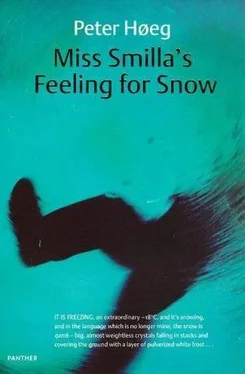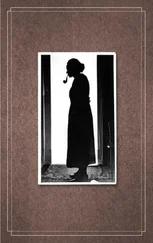Peter Høeg - Smilla's Sense of Snow aka Miss Smilla's Feeling for Snow
Здесь есть возможность читать онлайн «Peter Høeg - Smilla's Sense of Snow aka Miss Smilla's Feeling for Snow» весь текст электронной книги совершенно бесплатно (целиком полную версию без сокращений). В некоторых случаях можно слушать аудио, скачать через торрент в формате fb2 и присутствует краткое содержание. Жанр: Современная проза, на английском языке. Описание произведения, (предисловие) а так же отзывы посетителей доступны на портале библиотеки ЛибКат.
- Название:Smilla's Sense of Snow aka Miss Smilla's Feeling for Snow
- Автор:
- Жанр:
- Год:неизвестен
- ISBN:нет данных
- Рейтинг книги:3 / 5. Голосов: 1
-
Избранное:Добавить в избранное
- Отзывы:
-
Ваша оценка:
- 60
- 1
- 2
- 3
- 4
- 5
Smilla's Sense of Snow aka Miss Smilla's Feeling for Snow: краткое содержание, описание и аннотация
Предлагаем к чтению аннотацию, описание, краткое содержание или предисловие (зависит от того, что написал сам автор книги «Smilla's Sense of Snow aka Miss Smilla's Feeling for Snow»). Если вы не нашли необходимую информацию о книге — напишите в комментариях, мы постараемся отыскать её.
Smilla's Sense of Snow aka Miss Smilla's Feeling for Snow — читать онлайн бесплатно полную книгу (весь текст) целиком
Ниже представлен текст книги, разбитый по страницам. Система сохранения места последней прочитанной страницы, позволяет с удобством читать онлайн бесплатно книгу «Smilla's Sense of Snow aka Miss Smilla's Feeling for Snow», без необходимости каждый раз заново искать на чём Вы остановились. Поставьте закладку, и сможете в любой момент перейти на страницу, на которой закончили чтение.
Интервал:
Закладка:
Opinion was divided in North Greenland. My mother, along with many others, preferred winter. Because of the hunting on new ice, because of the deep sleep, because of the handicrafts, but most of all because of the visiting. Winter was a time for community, not for the end of the world.
In school they also told us that Danish culture had made great progress since ancient times and the theory of a Fimbul winter. There are moments when it's difficult for me to believe this is true. Like now, when I'm wiping down the tanning bed in the ship's weight room with alcohol.
The ultraviolet lights from a tanning bed split small amounts of the oxygen in the air, creating the unstable gas ozone. Its sharp smell of pine needles is found in the summer in Qaanaaq, too, with its almost painfully bright sunshine in the glare off the snow and sea.
One of my duties is to wipe off this thought-provoking apparatus with alcohol.
I've always enjoyed cleaning. Even though they tried to teach us laziness in school.
For the first six months we were taught in the village by the wife of one of the hunters. One summer day they came from the boarding school and wanted to take me to town. A Danish pastor and a West Greenlandic catechist. They issued orders without looking at our faces. They called us avanersuarmiut, people from the north.
Moritz forced me to go. My brother had grown too big and too obstinate for him. The boarding school was in Qaanaaq, in the town itself. I stayed for five months, until my fighting spirit had matured sufficiently that I could refuse.
In school we had all our meals served to us. We had a hot bath every day and clean clothes every other. In the village we had bathed once a week, much less often when hunting or traveling. Every day, from the glacier above ahe cliffs, I had collected kangirluayhuq, big blocks of freshwater ice, and carried them home in sacks and heated them over the stove. At the boarding school you turned on a faucet. When summer vacation arrived, all the students and teachers went out to Herbert Island and visited the hunters, and for the first time in a long while we had boiled seal meat and tea. That's when I noticed the paralysis. Not just in me but in everybody. We could not pull ourselves together anymore; it was no longer a natural thing to reach out for some water and brown soap and the package of Neogene and start rinsing the skins. We weren't used to washing clothes, we couldn't pull ourselves together to cook. At every break we would slip into a daydreaming state of waiting. Hoping that someone would take over, would relieve us, free us from our duties, and do what we ourselves ought to have done.
When I understood where things were heading, I rebelled against Moritz for the first time and went home. It was also a return to relative contentedness with my work.
This same contentedness comes over me now as I'm vacuuming the cabins in the crew's quarters on the upper deck of the Kronos. The same sense of calm as when I repaired nets in my childhood.
Strict order reigns in every one of the cabins. The crew understands-as I did to survive the boarding schools in my life-that when you have only a few cubic yards to yourself and your innermost feelings, that private space must be subjected to the severest discipline if it is to withstand the dissolution, destruction, and pressure to yield coming from all sides.
In his own way Isaiah had this fastidiousness, too. The mechanic had it. The crew of the Kronos has it. Surprisingly enough, Jakkelsen has it, too.
On his walls Jakkelsen has banners, postcards, and little souvenirs from South America, the Far East, Canada, and Indonesia. All the clothes in the closet are meticulously folded and stacked up.
I feel around among the stacks. I take off the mattress and vacuum out the cubbyhole for the bed linen. I pull out the desk drawers, I get down on my knees and look under the desk, I carefully examine the mattress. His closet is full of shirts. I touch every one of them. Some of them are raw silk. He has a collection of aftershave lotions and eau de toilette that smell expensive and sweetly alcoholic; I open them and put a dab of the fragrance on a paper napkin, which I then roll into a ball and put in the pocket of my smock, to flush down the toilet later on. I'm looking for something specific, but I don't find it. Or anything else of interest, either.
I put the vacuum cleaner back and go downstairs, past the second deck, past the cold storage and the supply rooms, and on down the stairs,, bordered on one side by the smokestack housing and on the other by a wall labeled DEEP TANK. At the bottom of the stairs is the door to the engine room. I'm carrying in my hand a bucket and scrub brush as a ready excuse, and if that's not enough, I can always fall back on the tried-and-true story that I'm a stranger who's gotten lost.
The door is heavy and insulated, and when I open it the noise is deafening at first. I'm out on a steel platform from which a gallery extends, running around the entire perimeter of the room.
On the deck thirty feet below me on a slightly raised platform in the middle of the room, the engine looms up. It's in two sections: the main engine with nine exposed cylinder heads and a six-cylinder auxiliary engine. The shiny valves move rhythmically like parts of a beating heart. The entire engine block is about sixteen feet high and forty feet long, and the whole thing gives the impression of an overwhelming, tamed savagery. There's not a soul in sight.
The steel of the walkway is perforated, my canvas shoes are walking right over the drop beneath me. Everywhere signs prohibit smoking in five languages. Several yards up ahead there's an alcove. A blue veil of tobacco smoke is seeping out. Jakkelsen is sitting on a folding chair with his feet up on the worktable smoking a cigar. Half an inch under his lower lip there's a blood blister running the whole width of his mouth. I lean against the table, in order to discreetly put my hand on the 13-inch monkey wrench lying there.
He takes his feet off the table, puts down the cigar, and gives me a big smile. "Smilla. I was just sitting here thinking about you."
I let go of the wrench. His restlessness has been temporarily stowed away.
"I've got a bad back, you know. On other ships they take it easy while they're at sea. Here we start at 7:00 A.M. Chipping off rust and splicing mooring cables and painting and scraping off oxide scale and polishing brass. How am I supposed to keep my hands looking presentable if I have to splice cable every single day?"
I don't reply. I try silence on Bernard Jakkelsen. He has very little tolerance for it. Even now when he's in good spirits, you can sense his underlying nervousness.
"Where are we off to, Smilla?" I simply wait.
"I've been sailing for five years, and I've never seen anything like this before. Alcohol prohibited. Uniforms. No one allowed on the boat deck. And even Lukas says that he doesn't know where we're going."
He puffs on his cigar again. "Smilla Qaavigaaq Jaspersen. That must be a Greenlandic middle name…" He must have looked at my passport. Which is in the ship's safe. That's something worth thinking about. "I've had a good look at this ship. I know everything about ships. This one here, she's got a double hull and icebreaker cables running the whole length of the ship. Up front the plates are thick enough to withstand an antitank grenade."
He gives me a sly look. "In the stern, over the propeller, there's an ice cutter. That engine produces at least 6,000 ihp, enough to sail at 16 to 18 knots. We're on our way up to the ice. I'm sure about that. You don't think we're heading for Greenland, do you?"
I don't have to reply to keep him talking.
"Then there's the crew. They're a pile of shit. And they stick together. They all know each other. And they're scared; can't get them to talk about why. And there are the passengers that we never see. Why are they coming along?"
Читать дальшеИнтервал:
Закладка:
Похожие книги на «Smilla's Sense of Snow aka Miss Smilla's Feeling for Snow»
Представляем Вашему вниманию похожие книги на «Smilla's Sense of Snow aka Miss Smilla's Feeling for Snow» списком для выбора. Мы отобрали схожую по названию и смыслу литературу в надежде предоставить читателям больше вариантов отыскать новые, интересные, ещё непрочитанные произведения.
Обсуждение, отзывы о книге «Smilla's Sense of Snow aka Miss Smilla's Feeling for Snow» и просто собственные мнения читателей. Оставьте ваши комментарии, напишите, что Вы думаете о произведении, его смысле или главных героях. Укажите что конкретно понравилось, а что нет, и почему Вы так считаете.




![Рута Шепетис - Ashes in the Snow [aka Between Shades of Gray]](/books/414915/ruta-shepetis-ashes-in-the-snow-aka-between-shades-thumb.webp)







